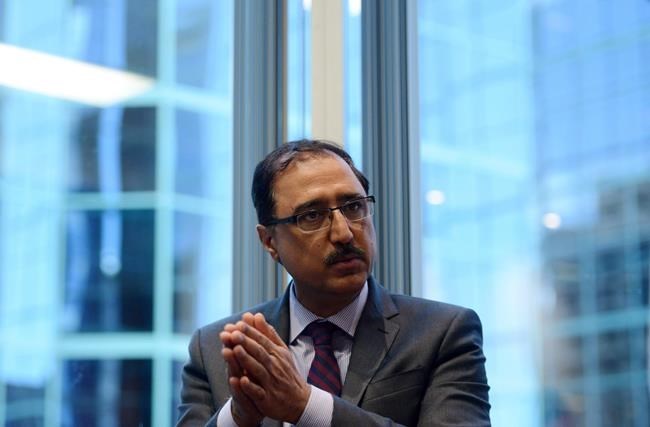
The federal infrastructure minister was told earlier this year that the government needed to change how it doles out infrastructure cash to ensure billions in new spending doesn't go to waste. Infrastructure and Communities Minister Amarjeet Sohi takes part in an interview at his office in Ottawa in a June 23, 2016, file photo. THE CANADIAN PRESS/Sean Kilpatrick
Republished October 14, 2016 - 11:09 AM
Original Publication Date October 14, 2016 - 10:25 AM
OTTAWA - The federal infrastructure minister was told earlier this year that the government needed to change how it doles out infrastructure cash to ensure billions in new spending doesn't go to waste.
The Liberals have promised to spend $60 billion over the coming decade on upgrading and transforming the country's infrastructure.
During a January event at the University of Ottawa, Infrastructure Minister Amarjeet Sohi and his top officials were told that up to a third of that potential economic impact could be lost without changes to the government's funding process, where officials check receipts and issue payments.
Sohi was told that tightening the vetting process by forcing cities and provinces to provide more details on projects could reduce that loss by up to two-thirds and in some cases double the impact of investments and the subsequent economic output.
The warning and recommendations were the first of many that Sohi and the federal government have heard as the Liberals prepare for the second and more costly phase of the infrastructure program that is a cornerstone of their economic plans.
"That type of approach could be very good in this environment," said former parliamentary budget officer Kevin Page, who helped host the January event.
"What we often don't really understand as citizens, and there are even MPs that are sitting in legislatures, why did we pick this project and not another project? And I think with a performance framework, that kind of transparent reporting, people will have a better understanding."
Although many of the details of the second phase have yet to be finalized, Sohi's office suggested this week they will address the concerns first raised 10 months ago.
"We have used many of the ideas from the session as we design our long-term infrastructure plan, which will be released in the coming months," said Kate Monfette, Sohi's director of communications.
The first phase of the Liberals' infrastructure program set aside $11.9 billion over two years to update and repair aging roads, transit systems, water and wastewater pipes and plants and social housing. The money was also supposed to help cities plan for larger projects during the second phase of the program, which is aimed at building what Sohi and Finance Minister Bill Morneau have called transformative projects.
A paper from the Public Policy Forum this week cited unidentified municipal and provincial who raised concerns the Liberals weren't being clear about what projects would qualify, making it difficult to plan ahead.
"Let's not waste this opportunity," Page said.
"We're dealing with weak growth right now, we have some fiscal space, we're going to deficit-finance this, now pick good projects, manage them well and use all the skills that are out there."
Research presented at the January event showed that governments promoting projects regularly overestimate their economic spinoffs while simultaneously underestimating costs in order to land funding from upper levels of government. Federal policy doesn't cover cost overruns, meaning the government that pushed the project has to pay.
Documents obtained by The Canadian Press under the Access to Information Act show that the City of Toronto, for example, asked the federal Liberals to pick up the extra costs on the Spadina-York subway extension project and the revitalization of Union Station and was denied both times.
Attendees at January event suggested the government have "an independent party or competent government entity" vet projects before they get funding, according to a summary paper of the event posted to the Infrastructure Canada website.
— Follow @jpress on Twitter.
News from © The Canadian Press, 2016